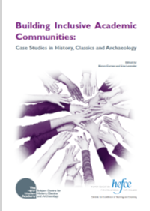July eBulletin Student assessment and feedback is currently a key issue in HE (and likely to take a higher profile if student fees are raised). The Subject Centre is participating in a research project on feedback and dialogue: It’s Good to Talk. As part of the project we have designed a very short (2 minute) survey on lecturers’ attitudes to feedback. We would be very grateful if you could take the time to fill this in. Our e-Library continues to expand but we welcome further participants to add key works or to comment on existing entries. More information may be found here. I am sure that you will enjoy reading our two new publications which are spotlighted below. The Subject Centre will be running a reduced admin service over the summer, so please bear with us if you e-mail or phone us. Dr Sarah Richardson, History Subject Director News
Upcoming Events
Spotlight
|

Kate Bradley
Contemporary Britain is becoming increasingly popular both as a subject for historical research as well as for undergraduate and postgraduate teaching. There is a burgeoning literature on the cultural, economic, political and social aspects of Britain in the 20th and 21st centuries, supported by well-respected journals focussing on the period and a growing number of online resources to support teaching and research. Contemporary history, of Britain or elsewhere, forms a major part of the undergraduate curriculum. |
 Kimm Curran and Lisa Lavender
This collection shows the active involvement and rich knowledge of discipline-relevant CETL work and the wider communities in History, Classics and Archaeology, on areas such as e-learning and employability: key themes in the work of the HCA and Higher Education Academy.
The case studies provide future faculty members in particular with examples of good academic practice by those who have experience in the field, but also by those who are ‘new to the game’ and have tried innovative approaches to teaching their subject(s). Participants have varied approaches to teaching and learning within their subject areas and provide examples of the successes (and pitfalls) of trying something ‘new’ or ‘tried and true’. |